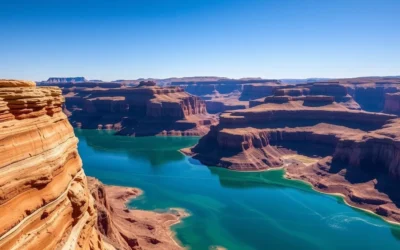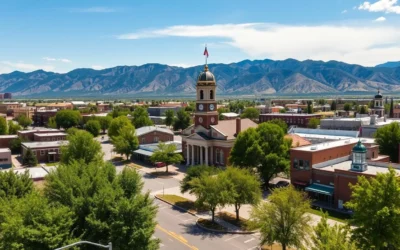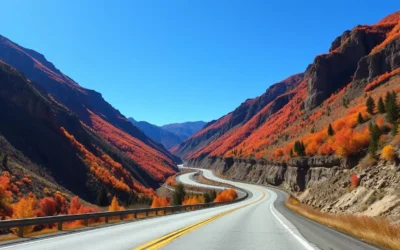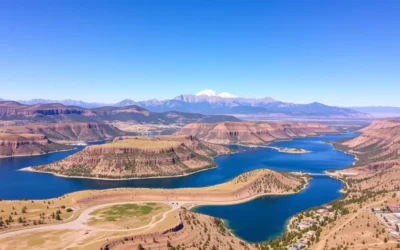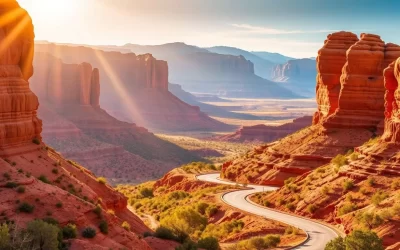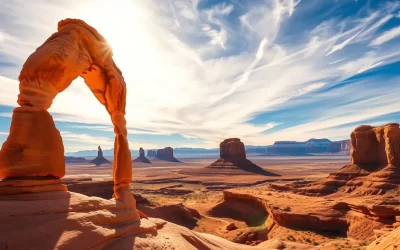Imagine standing amidst dramatic sandstone cliffs and experiencing the depths of a breathtaking canyon. Zion National Park is a renowned destination that offers world-class hiking and climbing opportunities, drawing millions of visitors each year.
This comprehensive guide will walk you through the best things to do in Zion National Park, from iconic hikes like Angels Landing to hidden gems that many visitors miss. Whether you’re an avid hiker or a nature lover, you’ll discover essential information for planning your trip and insider tips to make the most of your time in this Utah wonderland.
By exploring Zion National Park, you’ll experience one of America’s most spectacular natural treasures, with activities for all interests and ability levels.
Discovering the Wonders of Zion National Park
Zion National Park stands out among other national parks due to its accessible yet dramatic landscapes, making it an ideal location for a wide range of activities. As you explore this incredible park, you’ll discover a diverse array of ecosystems, from the Virgin River to the towering red rock formations.

Park Overview and Geography
Zion National Park is characterized by its unique geography, featuring steep canyons, towering cliffs, and a variety of rock formations. The park’s landscape has been shaped by millions of years of geological activity, resulting in the breathtaking scenery that visitors see today. The Virgin River, which runs through the park, has played a significant role in carving out the canyon landscapes over time.
| Geological Feature | Description |
|---|---|
| Virgin River | A vital part of Zion’s ecosystem, carving out the canyon landscapes |
| Red Rock Formations | Iconic sandstone formations that give Zion its distinctive look |
| Canyons and Cliffs | Steep canyons and towering cliffs that define the park’s landscape |
What Makes Zion Special
Several factors contribute to Zion’s uniqueness among national parks. Firstly, its diverse ecosystems support over 1,000 plant species and hundreds of wildlife species, including the endangered California condor and desert bighorn sheep. The park’s extraordinary color palette, which shifts throughout the day as sunlight plays across the red rock formations, creates a photographer’s paradise, especially at sunrise and sunset. Additionally, Zion offers experiences for every ability level, from wheelchair-accessible riverside walks to challenging technical canyoneering adventures.
- The park’s unique combination of accessibility and dramatic landscapes allows visitors to stand at the bottom of towering canyons.
- The diverse ecosystems support a wide range of flora and fauna.
- Zion’s human history spans thousands of years, from ancient Ancestral Puebloan peoples to Mormon settlers.
Whether you’re interested in hiking, biking, or simply taking in the views, Zion National Park has something to offer. You can consider wading through The Narrows, biking the Zion Canyon Scenic Drive, or hanging out in one of Zion’s many beautiful campgrounds, looking for wildlife among the Cottonwood trees.
Best Time to Visit Zion National Park
Determining the best time to visit Zion National Park is crucial for a safe and enjoyable experience. The park’s unique geography creates a variety of climates and conditions throughout the year, making some times more suitable for certain activities than others.
Seasonal Highlights
Zion National Park offers distinct experiences with each season. Spring brings variable conditions, with pleasant days and the potential for sudden storms. It’s a great time for hiking and exploring as the snow melts and wildflowers begin to bloom. Summer is peak tourist season, but it comes with temperatures often exceeding 100°F (38°C), making hiking challenging. Afternoon thunderstorms are common during the summer monsoon season (July-September), posing flash flood risks in areas like The Narrows.

Fall offers the most stable and comfortable weather, ideal for hiking and outdoor activities. The temperature difference between the canyon floor and higher elevations can be significant, so layered clothing is recommended. Winter brings colder temperatures, especially at night, with occasional snow and ice making trails slippery. Microspikes are often necessary for safety on popular hikes during this time.
Weather Considerations
Understanding the weather patterns is vital for planning your visit. The summer months are characterized by extreme heat and the risk of thunderstorms, while winter months bring cold and potential icy conditions. Spring and fall are generally more favorable, with mild temperatures and fewer crowds. Regardless of the time of year you visit, being prepared for the season and checking the weather forecast is essential. The flow of water in the Virgin River varies with the season, affecting activities like wading and tubing.
Planning your activities according to the months and expected weather conditions will enhance your experience. For instance, visiting The Narrows during dry months can be quite different from experiencing it during a flash flood event.
Essential Information for Your Visit
Before you embark on your adventure to Zion National Park, it’s crucial to be aware of the essential information that will make your visit smooth and enjoyable. Understanding the park’s entrance policies, transportation options, and what to pack will enhance your experience.
Park Entrance and Fees
When planning your visit, it’s essential to understand the park’s entrance fees and policies. The entrance fee for a private vehicle is valid for seven days. You can also purchase an annual pass for frequent visits. Be sure to check the park’s website for the most current fees and any specific regulations.
Transportation and Shuttle System
Zion National Park operates a shuttle system during peak seasons to reduce traffic congestion. The shuttle service is free, and it stops at various points of interest within the park. You can also use the park’s transportation system to get to some of the more remote areas.

What to Pack for Zion
Packing the right gear is vital for a successful hike in summer. You’ll need at least 1 gallon of water per person per day, along with electrolyte supplements. Hiking boots with good ankle support are essential for most trails. Don’t forget sun protection, including a hat, UPF clothing, and reef-safe sunscreen.
| Item | Importance | Notes |
|---|---|---|
| Water | High | 1 gallon per person per day in summer |
| Hiking Boots | High | Sturdy boots with ankle support for most hikes |
| Sun Protection | High | Hat, UPF clothing, and reef-safe sunscreen |
By being prepared and knowing what to expect, you can make the most of your time at Zion National Park.
Iconic Hikes in Zion National Park, Utah: Best Things to Do – Top Picks
For outdoor enthusiasts, Zion National Park presents an array of iconic hikes that are not to be missed. With its unique red rock formations and diverse landscapes, Zion offers trails for hikers of all skill levels.
Angels Landing Trail
The Angels Landing Trail is one of Zion’s most famous and challenging hikes, known for its steep drop-offs and breathtaking views from the summit. This hike is not for the faint of heart, requiring a good level of physical fitness and mental toughness.

To tackle this hike, visitors must obtain a permit through the Zion National Park’s lottery system, which can be applied for online. The hike is approximately 5 miles round trip, with a significant elevation change.
The Narrows
The Narrows is another iconic hike in Zion, involving wading through the Virgin River as it winds its way through a stunning gorge. This hike is unique because it takes place primarily in the river, requiring hikers to be prepared to get wet.

For The Narrows, hikers can rent equipment such as walking sticks and waterproof footwear from various outfitters near the park. The hike can vary greatly in distance, depending on how far one chooses to go up the river.
Canyon Overlook Trail
The Canyon Overlook Trail is a shorter, more accessible hike that still offers spectacular views of Zion Canyon. This 1-mile round-trip hike begins just east of the Zion-Mount Carmel Tunnel and climbs to a breathtaking overlook.
The trail features interesting geological formations, including a natural cave-like alcove and unique erosion patterns in the sandstone. It’s a great option for families or those with limited time, and it’s accessible by private vehicle year-round.
The Canyon Overlook Trail offers one of Zion’s most spectacular views for minimal effort, making it perfect for families or casual hikers. Unlike most popular Zion hikes, it doesn’t require the shuttle, and the trail is relatively easy, making it a great introduction to hiking in Zion.
Moderate and Family-Friendly Trails
For those looking for trails that are a bit more laid-back, Zion National Park offers several moderate and family-friendly options. These trails provide a great way to experience the park’s natural beauty without the extreme difficulty of some of its more famous hikes.
Emerald Pools Trails
The Emerald Pools Trails are a series of connected trails that offer a moderate hike with rewarding views. The trails range from easy to moderate, making them suitable for families. You can enjoy the lower Emerald Pool, which is easily accessible, or continue on to the more secluded upper Emerald Pool and the Kayenta Trail.
- The trails feature beautiful scenery, including lush vegetation and the tranquil Emerald Pools.
- These trails are great for families because they offer a relatively easy hike with interesting sights along the way.
Riverside Walk
The Riverside Walk is a scenic, relatively flat trail that follows the Virgin River. It’s an excellent choice for families or those who want a leisurely hike without the need for the shuttle service, although the trailhead is accessible via the shuttle.
- This trail offers stunning views of the surrounding cliffs and the river.
- It’s a great introduction to the park’s unique landscape.
Watchman Trail
If you’re looking for a trail that doesn’t require taking the shuttle, the Watchman Trail is an excellent choice. The trailhead is near the south entrance to the park, making it easily accessible. This hike is moderately challenging with a elevation gain of approximately 368 feet.

The Watchman Trail is a 3.3-mile round-trip hike that offers panoramic views of the Watchman peak, Springdale, and lower Zion Canyon. The trail is particularly beautiful during sunrise and sunset when the changing light transforms the colors of the surrounding rock formations.
- The trail features desert terrain with cacti, yucca, and other desert plants.
- Interpretive signs along the way provide insights into Zion’s geology and ecosystems.
Off the Beaten Path Hikes
If you’re ready to escape the crowds, Zion has a variety of lesser-known hiking trails to discover. While many visitors flock to the park’s iconic hikes, there are numerous alternative routes that offer equally breathtaking experiences without the throngs of people.
Observation Point via East Mesa
The Observation Point via East Mesa trail is a challenging hike that rewards adventurers with spectacular views. This trail is less crowded than some of the park’s more popular hikes, making it an attractive option for those seeking solitude. The trailhead is located at the East Mesa Trailhead, and the hike involves a significant elevation gain.
Sand Bench Trail
The Sand Bench Trail is another less-traveled path in Zion National Park. This loop trail offers a unique perspective on the park’s diverse landscapes, from desert-like environments to more lush areas near the Virgin River. It’s a great choice for those looking to experience the park‘s natural beauty without the crowds.
Kolob Canyon Trails
Located in a different section of Zion National Park, the Kolob Canyons area provides a distinct experience. The Kolob Canyon area is known for its finger-like red rock canyons and spectacular viewpoints. The Taylor Creek Trail, a 5-mile round-trip hike, is a highlight, leading to the Double Arch Alcove. For a shorter hike, the Timber Creek Overlook Trail offers panoramic views of the Kolob Canyons.
Scenic Drives and Viewpoints
As you explore Zion National Park, you’ll discover stunning scenic drives and viewpoints that offer breathtaking views of the park’s unique landscape.
Zion Canyon Scenic Drive
The Zion Canyon Scenic Drive is a must-experience when visiting the park. This 6-mile drive follows the Virgin River and offers stunning views of the canyon walls. You’ll pass through the park’s most spectacular scenery, with numerous pull-outs and viewpoints along the way. Be sure to stop at the Canyon Junction Bridge, one of the most iconic photo spots in the park, especially during sunset.
Zion-Mount Carmel Highway
The Zion-Mount Carmel Highway is another scenic drive that takes you through a diverse range of landscapes. This highway features the famous Checkpoint Tunnel, which is a unique experience. As you drive through the tunnel, you’ll emerge into a completely different environment, with breathtaking views of the surrounding landscape.
Best Overlooks and Photo Spots
Zion National Park is renowned for its photography opportunities. Some of the best overlooks include:
- Canyon Junction Bridge, offering classic Zion photographs.
- Pa’rus Trail, providing riverside photo opportunities.
- Court of the Patriarchs Viewpoint, capturing three massive sandstone peaks.
| Viewpoint | Best Time to Visit | Notable Feature |
|---|---|---|
| Canyon Overlook | Morning | Dramatic vista of the lower canyon |
| Big Bend | Golden Hour | Unobstructed views of the Great White Throne |
| Court of the Patriarchs | Morning | Three massive sandstone peaks |
Water Activities and Adventures
Water activities and adventures are a significant part of the Zion National Park experience, offering something for every interest and skill level. Whether you’re looking to explore the park’s rivers, canyons, or simply enjoy the scenic beauty, there’s a water-based activity for you.
Wading Through the Virgin River
Wading through the Virgin River is a refreshing way to experience Zion’s natural beauty. The river flows through the park, offering a unique perspective on its landscapes. Visitors can enjoy a leisurely walk or wade through the river’s waters, taking in the surrounding scenery.
Guided Adventure Tours

For a more immersive experience, consider one of the guided adventure tours available in Zion National Park. These tours offer a thrilling way to explore the park’s hidden gems, including its slot canyons, less-visited areas, and scenic viewpoints. Options include canyoneering tours, guided hiking tours, rock climbing excursions, horseback riding tours, and photography tours, each providing a unique perspective on the park’s natural wonders.
- Canyoneering tours explore Zion’s hidden slot canyons with professional guides.
- Guided hiking tours provide insider knowledge about less-visited areas.
- Rock climbing excursions cater to various skill levels.
- Horseback riding tours offer a traditional western experience.
- Photography tours help visitors capture the park’s magic.
Wildlife and Nature Experiences
As you explore Zion National Park, you’ll encounter a range of wildlife and natural wonders that make the park a standout destination. The park’s diverse landscapes support a wide variety of flora and fauna, creating a rich environment for nature lovers and wildlife enthusiasts.
Spotting Bighorn Sheep and Other Wildlife
Zion is renowned for its wildlife, including the iconic bighorn sheep. These majestic animals can often be seen navigating the park’s rugged terrain. To spot them, keep a safe distance and be patient, as they can be shy. Other wildlife in the park includes mule deer, peregrine falcons, and a variety of other bird species. The park’s diverse habitats support a range of wildlife, making it a great place for observation and photography.
Stargazing in an International Dark Sky Park
Zion National Park’s designation as an International Dark Sky Park makes it one of the best places in the US for stargazing. The park’s minimal light pollution allows for breathtaking views of the night sky. Kolob Terrace is particularly noted for its excellent stargazing opportunities due to its high elevation and open meadows.
For the best stargazing experience, visit during a new moon phase and allow your eyes to adjust to the darkness. Rangers offer night sky programs during the summer, providing telescopes and guidance to enhance your experience.
| Stargazing Location | Features |
|---|---|
| Kolob Terrace | High elevation, open meadows, minimal light pollution |
| Pa’rus Trail | Near Visitor Center, expansive views |
| Kolob Canyons Viewpoint | Dark skies, scenic overlook |
Exploring Lesser-Known Areas of Zion
Beyond the popular trails of Zion National Park lies a world of lesser-known areas waiting to be explored. While many visitors flock to the park’s iconic trails, these hidden gems offer a unique and peaceful experience.
Kolob Terrace
Located in the northwestern part of the park, Kolob Terrace is a serene and picturesque region that offers a tranquil escape from the crowds. This area is characterized by its lush forests, meadows, and the Kolob Terrace Road, a scenic drive that’s perfect for those who want to enjoy the park’s natural beauty without the hustle and bustle. You can explore the area through various hiking trails, such as the Kolob Terrace Trail, which takes you through a beautiful landscape of forests and meadows.
Kolob Canyons
The Kolob Canyons section of Zion National Park is another lesser-known area that’s worth visiting. Located near Cedar City, this area offers a completely different landscape of finger-like red rock canyons. You can access Kolob Canyons via its own entrance off I-15, about 40 miles north of the main Zion Canyon. A scenic 5-mile drive through Kolob Canyons culminates at the Kolob Canyons Viewpoint, offering spectacular panoramas of crimson cliffs and deep canyons without requiring any hiking. The area features several excellent trails, including the moderate Taylor Creek Trail to Double Arch Alcove and the more challenging La Verkin Creek Trail to Kolob Arch, one of the world’s largest free-standing arches.
Where to Stay In and Around Zion
Choosing the right accommodation is a key part of planning your visit to Zion National Park. The park and its surrounding areas offer a variety of lodging options to suit different needs and budgets.
Lodging Inside the Park
For a truly immersive experience, consider staying inside Zion National Park at the Zion Lodge. To book your stay, visit the official website or call their reservation line.

Camping Options
If you prefer to camp, Zion National Park offers several campsites. For reservations, you can use the official park website or contact their information line.

Nearby Towns and Accommodations
The town of Springdale is located right outside the park’s south entrance and offers a range of accommodations, from budget-friendly motels to luxury resorts. You can explore options and book through various travel websites or directly through the hotels’ websites.
Other nearby towns, such as Hurricane and La Verkin, also provide affordable accommodation options. For those visiting the Kolob Canyons section, Cedar City is a convenient option, with the added bonus of the Utah Shakespeare Festival during summer.

Day Trips and Nearby Attractions
Beyond the breathtaking landscapes of Zion National Park lies a world of adventure waiting to be discovered on a day trip. The area surrounding Zion is rich in natural wonders and unique attractions that are worth exploring.
Coral Pink Sand Dunes State Park
Just a short drive from Zion, Coral Pink Sand Dunes State Park offers a unique landscape of vibrant pink sand dunes, perfect for hiking, sandboarding, or simply enjoying the scenic views. The park’s distinct coloration is due to the presence of red garnet in the sand, creating a visually striking environment.
Kanarra Falls
Kanarra Falls is another attractive day trip destination, featuring a scenic hike to a picturesque waterfall. The hike involves wading through water and using ladders, making it an adventurous experience. The falls are a beautiful sight, surrounded by the natural beauty of the area.
Antelope Canyon and Horseshoe Bend
For a more extensive day trip, consider visiting Antelope Canyon and Horseshoe Bend, located near Page, Arizona. These natural wonders are approximately a two-hour drive from Zion. Antelope Canyon is renowned for its surreal light beams and red sandstone walls, while Horseshoe Bend offers a dramatic view of the Colorado River. Both attractions require some effort to visit, but the experience is well worth the day trip.

Conclusion
Your adventure at Zion National Park will be a memorable one, with experiences that cater to all kinds of travelers. The park offers something for everyone, from casual sightseers to dedicated adventurers, with experiences that change dramatically with the seasons, making it worth visiting multiple times throughout your lifetime.
While iconic hikes like Angels Landing and The Narrows deservedly capture attention, don’t overlook the quieter pleasures of Zion—watching the changing light on canyon walls, spotting wildlife along the Virgin River, or simply sitting in contemplation beneath towering cottonwood trees.
Planning is essential for the best Zion National Park experience, particularly regarding permits for popular hikes, shuttle schedules, and seasonal considerations. However, leave room for spontaneous discoveries that often become the most memorable moments of your trip.
Consider extending your stay to explore beyond the main canyon, as Kolob Terrace, Kolob Canyons, and nearby attractions like Coral Pink Sand Dunes offer equally magnificent experiences without the crowds. Whether you’re embarking on your first national park adventure or are a seasoned explorer, Zion’s unique combination of accessibility and wilderness, grandeur and intimacy, makes it a destination that continues to inspire awe and connection with the natural world with each visit.
In and around Zion National Park, you’ll find a variety of things to do, making your day or trip truly unforgettable. With careful planning and an open mind, your visit to this incredible national park will be a best things to do in your year.
The above is subject to change.
Check back often to TRAVEL.COM for the latest travel tips and deals.

